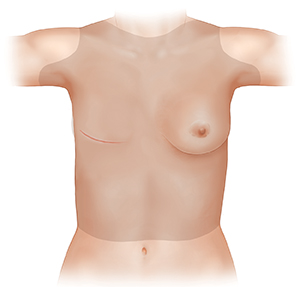Mastectomy: Follow-Up Care
Successful treatment of your cancer is the first step toward a healthier future. Now you can start a follow-up program. This should include visits to your healthcare provider and regular mammograms. You also need to know how your breast and chest area normally look and feel so you can find any changes right away. Each part of this program will help give you peace of mind as you start your life after treatment.
Visit your healthcare provider
Your provider will want to watch your health closely even after treatment. See your provider as directed. You may be asked to come in every few months after treatment. And then twice a year or once a year as more time passes. Other members of your healthcare team will also want to see you. Report any changes in your chest wall scar and remaining breast or problems with your general health at these visits.
Schedule mammograms
Your healthcare provider will tell you how often to have mammograms on the breast that wasn't removed. X-rays may be taken during your appointment. MRIs may be done along with your mammograms. This is common after treatment for breast cancer. You no longer need to have mammograms if both breasts were removed (double mastectomy).
Become familiar with how your breast and chest area look and feel. Your breasts, chest, and armpit probably look and feel different if you’ve had breast surgery or radiation therapy. There may be numb areas or places where the skin feels hard or tight. Ask your provider what changes are normal and what to look for. Remember to check:
-
Both the left and right side of your chest
-
Any cuts (incisions) or scars
-
Above and below your collarbone
-
Your armpits
-
Your entire chest wall, down to the bottom of your ribs
-
Your hand, wrist, and arm on the treated side for swelling (lymphedema) or changes in how well you can move
 |
| Feel for changes in the shaded area shown above. |
© 2000-2024 The StayWell Company, LLC. All rights reserved. This information is not intended as a substitute for professional medical care. Always follow your healthcare professional's instructions.